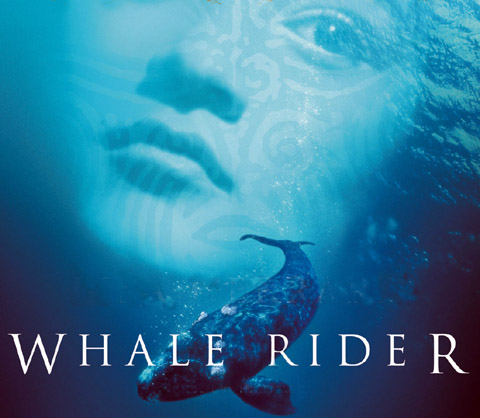by
Faith Harding on 17 September 2006
Top
Hat Entertainment and The Storybook Theatre present:
A MOVIE FOR THE ENTIRE FAMILY:
Whale Rider
Oscar nominated 2003 movie
Where: The Storybook Theatre
Hanapepe Road in Old Hanapepe Town
When: Sunday,
October 1st 2006
from 4pm to 6pm (a voluntary contribution will
be appreciated)
contact: Faith Harding
phone: 808-742-7538
email: tophatandscarf@yahoo.com
website: www.tophatentertainment.mysite.com
"An
Exquisite Masterpiece!"
review by Ralph Michael Stein lawprof@pipeline.com
on 30 July 2003
on International Movie Data Base www.imdb.com
"I don't use the word "masterpiece" often when reviewing
a film but for "Whale Rider," it's an inadequate accolade.
This is one of the most moving, beautiful and powerful films I have
seen in years.
Screenplay author and director Niki Caro faithfully translated Witi
Ihimaera's novel of the same name, a poignant and sometimes sad but
ultimately uplifting story of New Zealand Maoris seeking, with the leadership
of a difficult, stubborn and often harsh elder to sustain their peoples'
values and customs.
Australia and New Zealand are both encountering, in politics and in
culture (and often the two are inextricably linked), their shared heritage
of white oppression of native peoples. Much of this history is unknown
to Americans and Europeans who view Australia through a bird's eye picture
of the Sydney Opera House and New Zealand with even fewer associational
icons.
Recently, "Rabbitproof Fence" painfully depicted the policy
of Australia to force lighter skin aborigines into "schools"
where they would be nurtured to become "semi-whites" and then
married to those of similar skin tone. The object was to bleach the
blackness out of Australia and the horrors of this incarnation of cultural
and anthropological genocide are on full display in that film.
"Whale Rider" takes a different and, in the end, perhaps a
more powerful approach. There are virtually no whites in the film and
only children's t-shirts and some music blasting from a boombox suggests
the encroaching force of the controlling majority.
The cast is unknown to Americans and their names can be found on the
IMDb homepage for the film. The lead actress, however, must be named.
In the role of "Pai," a young girl whose mother dies at her
birth along with her twin brother, is the extraordinary Keisha Castle-Hughes.
She imbues every scene with a commanding and inviting vitality. Hers
is an Academy Award (and any other major award) performance.
Pai's father left New Zealand for Europe, there to create and sell Maori
crafts. She lives with her grandmother and grandfather, the latter some
sort of unelected chieftain of the oceanside community. Bitter that
no male heir will succeed him and alternately cruel and loving to his
reluctantly acknowledged granddaughter, Koro starts a school to supplement
the young boys' secular education with inculcation of the ways of the
Maori. Pai wishes to join as an equal and is firmly, indeed harshly
rebuffed at every turn.
If the Maori language has the phrase "You go, girl!," then
it be directed towards the indefatigable but not arrogant Pai. It would
have been easy to make her the kind of thoughtless rebel that nature
often programs teenagers to be. The depth of her character resides in
her simultaneous quest for equality and her understanding of her grandfather's
unyielding attachment to patriarchal values. Pai's close relationship
with her grandmother, a woman living a life universally recognizable
to Americans, provides warmth and support and do some of her other relationships.
The story unfolds seamlessly with Maori music and rituals bridging the
spoken dialogue (mostly in English, some in Maori with subtitles).
Partly a straight tale, partly a gripping mystical fable, "Whale
Rider" never becomes saccharine.
The music and Maori songs complement but do not compete with the dialogue,
a welcome change from many movies today. The land and the ocean are
rawly gorgeous.
As in Australia, relations today between New Zealand's indigenous people
and the descendants of their vanquishers are sometimes tense. There
are open wounds from continuing political collisions over land and culture.
The Maoris are not a monolith and internal dissension is active. Serious
attempts to sustain Maori values and culture in the face of assimilative
pressures meet with varied degrees of success (in Koro's Maori school
the kids wear t-shirts with rock themes and one has a shirt advertising
an upstate New York resort area if I saw correctly). New Zealand's most
internationally renowned Maori is the opera diva Kiri te Kanawa who
is now dedicated to Maori cultural restoration projects. "Whale
Rider" can only give a boost to such efforts which, as this film
shows, makes not only New Zealand but the world richer."
|
